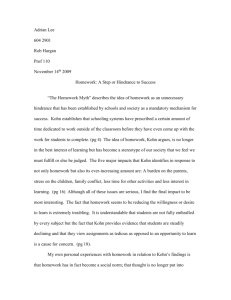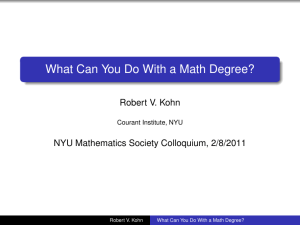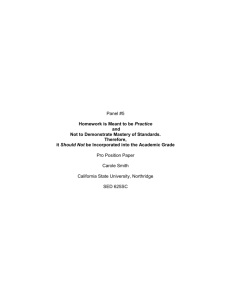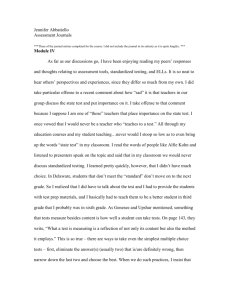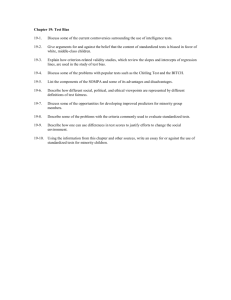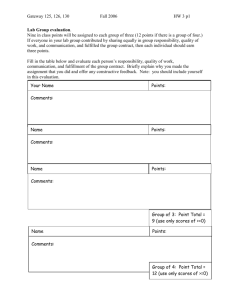Paper about Kohn's The Case Against Standardized Testing
advertisement
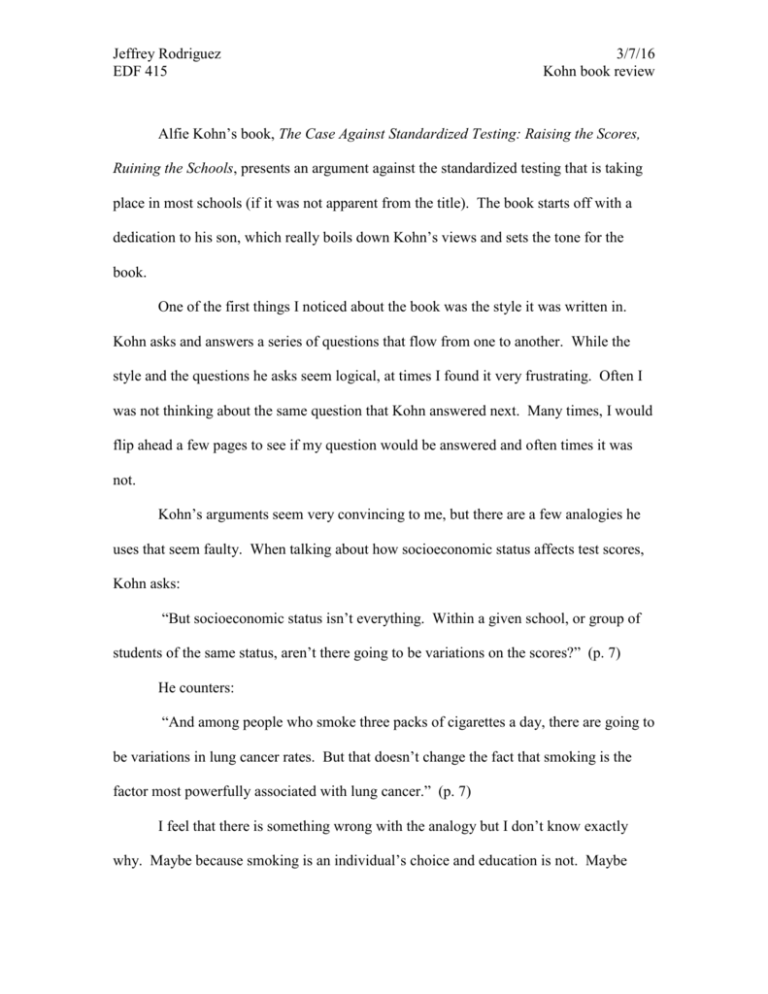
Jeffrey Rodriguez EDF 415 3/7/16 Kohn book review Alfie Kohn’s book, The Case Against Standardized Testing: Raising the Scores, Ruining the Schools, presents an argument against the standardized testing that is taking place in most schools (if it was not apparent from the title). The book starts off with a dedication to his son, which really boils down Kohn’s views and sets the tone for the book. One of the first things I noticed about the book was the style it was written in. Kohn asks and answers a series of questions that flow from one to another. While the style and the questions he asks seem logical, at times I found it very frustrating. Often I was not thinking about the same question that Kohn answered next. Many times, I would flip ahead a few pages to see if my question would be answered and often times it was not. Kohn’s arguments seem very convincing to me, but there are a few analogies he uses that seem faulty. When talking about how socioeconomic status affects test scores, Kohn asks: “But socioeconomic status isn’t everything. Within a given school, or group of students of the same status, aren’t there going to be variations on the scores?” (p. 7) He counters: “And among people who smoke three packs of cigarettes a day, there are going to be variations in lung cancer rates. But that doesn’t change the fact that smoking is the factor most powerfully associated with lung cancer.” (p. 7) I feel that there is something wrong with the analogy but I don’t know exactly why. Maybe because smoking is an individual’s choice and education is not. Maybe because smoking only has negative effects on cancer rates and status does not. Whatever the reason, I am not arguing with his point about socioeconomic status, just the way he delivers it. Despite the writing style, I agree with much of Kohn’s ideas. He lays out his arguments very logically and rather easy to follow. I found myself agreeing with most all of Kohn’s criticisms and flaws that standardized testing has, some of which I have experienced first hand. From the tests that I have taken, and the ones that I have tried to write, I have seen the flaws that different types of testing have. Standardized tests, for the most part, consist of multiple-choice questions. For many tests like this, there is a strategy for analyzing the questions and choosing the correct answer. Rather than actually know the material that the test covers, students lean these strategies for taking the tests. This, in essence, defeats the purpose of the test. Another flaw I find with multiple-choice tests is the kind of knowledge that it tests. It doesn’t allow the student to explain concepts or ideas that they have. It tests ‘quiz show’ style, factual knowledge rather than encouraging critical thinking. What good is knowing information and facts if you can not interpret them or know the meaning behind them. The problem with allowing students to express and analyze their ideas is assigning a grade to it. As Kohn points out, assessment like this is subjective and relies on the judgment of the teachers giving it. One of the arguments against assessment like this is the qualifications for teachers. My initial reaction to this argument was the same as Kohn’s. What makes the test more credible than the teacher? The teacher spends much more time with the students and sees how they are progressing over a period of time. In-line assessment like this, is a much better indicator of the student’s performance than one test score. As Kohn points out and as the statistics show, test scores can fluctuate according to many factors, a large portion of which are out of the schools influence. Of Kohn’s main arguments against standardized tests: They should not be timed. They should not be given to young children. They should not be given too frequently. They should not be normreferenced—or reported in such a way as to emphasize rankings rather than absolute scores. They should not consist of multiple-choice questions. They should be designed to tap students’ understanding of ideas rather than their ability to memorize lists of facts and definitions. (p. 45) I find any one of those points very hard to disagree with. As I read the points I thought of tests that I have heard about or have experience with. The first one that came to mind, which was mentioned earlier in the book, is the Iowa tests. I took them as a child and had always wondered what my scores were and if they were used for anything. Luckily, my parents still had my results from these tests saved and I was able to go through them. As Kohn had said, my scores were reported as percentiles on every report, four or five in total. I asked my parents if the scores were used for anything in school and they don not remember them being used. They were only a reference to how ‘smart’ the kids were far the parents’ information. The second test that I have heard of and read a little about is the DIBELS (Dynamic Indicators of Basic Early Literacy Skills) test, which seems to be gaining steam recently. My understanding of the test is that it is a timed, multiple-choice test given to very young students. When I first heard of the test, I was cautious because it is given to such young students, some as young as kindergarten. To be fair, I do not know what is done with the results of the test, if they are used to group kids by ability, or determine if the students need any extra help beyond the regular classroom instruction. For me, much of this discussion about standardized testing is new. I have heard many people argue against standardized testing, but never really weighed both sides of the argument. Really, the first arguments in support of standardized testing came from America’s Teachers. In chapter seven, there is a brief summary about Diane Ravitch and Chester Finn which states, “they have became advocates of teaching to the test—focusing instruction on the specific content of standardized test—because they believe the strategy enhances learning and reassures the public with rising test scores.” (Newman, 2006) While that does not give any reasoning for their beliefs, it is the first time I have heard of anyone supporting that style of instruction. One or two questions, however, keeps coming up in my mind and they never seems to be answered. I have come to expect that I will not receive an answer unless I ask people individually. Of the large supporters of standardized testing, who of them actually took any tests like these when they were in school? Similarly, how many of them have talked with their own children about the tests they take? I suspect that the answer will be ‘very few’ for both questions, but I don’t know for sure. If the answer is ‘yes, took them and my children also love them’ I am fascinated to know the reasoning why they still support the tests the way they do. My final thoughts on the entire topic of standardized testing have to do with teacher preparation. It seems that throughout my education classes and experience with education professionals, almost no one supports the amount of testing that we have in schools now. Professors and teachers will present both sides of the argument but when talking about why testing is a good thing they seem sarcastic and obligated to dispense the information. If such a large portion of the education profession is against the amount and types of testing that we have then why is there still so much prevalent? I understand that there is a huge amount of political and public pressure put on almost every level of education, but why are we always folding to it? I suppose that the underlying reason behind everything is money, but is that a good enough reason? Shouldn’t a quality education for our children be more important than how much money the school receives based on test scores?
